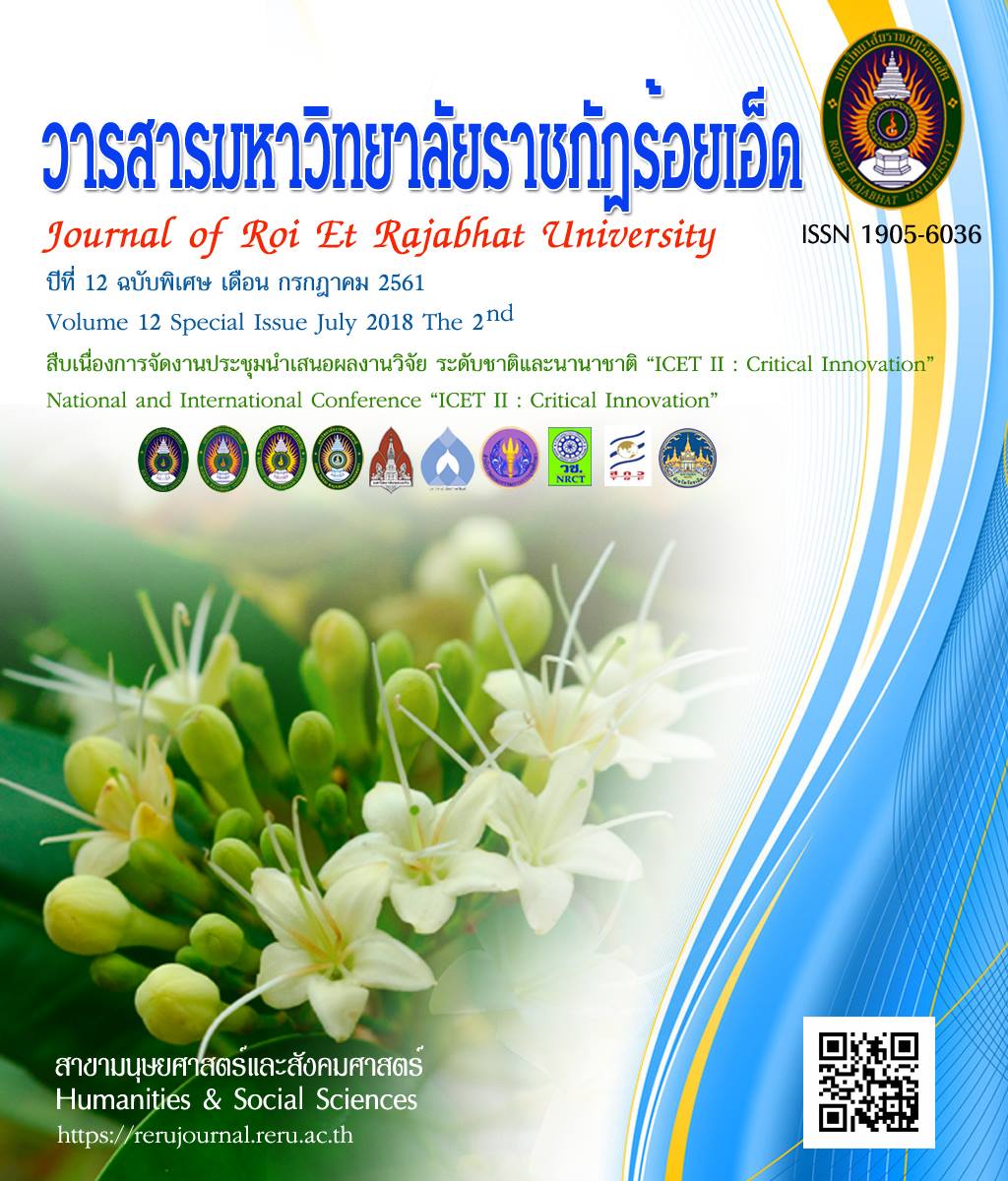The development of student’s competency in peer counseling
Keywords:
counseling competency, peer counseling, counseling training group programAbstract
The objective of this research was to compare development of student’s competency in peer
counseling. The sample of the study was 30 first to three years students in Education faculty, Rajabhat
Songkhla University by Volunteer Sampling. The sample group was the experimental group and
participated in competency counseling training group program. The research instruments were competency
counseling test with reliability coefficient (alpha) of .85 and the competency counseling training group
program for developing competency counseling with item objective (IOC) ranged from 0.6-1.0. The data
was analyzed by frequency, percentage, average mean, standard deviation and t-test.The results of
the study was significant differences was 0.01 level in general and factors of competency counseling in
the training group before and after experiments. The results of this study indicated that the competency
counseling training group program was a key factor to increase a positive change in the competency counseling
References
ในการให้คำปรึกษา หน่วยที่ 9-15. หน้า 367-413. นนทบุรี: โรงพิมพ์มหาวิทยาลัยสุโขทัยธรรมาธิราช.
กรมสุขภาพจิต. (2546). คู่มือการให้คำปรึกษาขั้นพื้นฐาน. กรุงเทพฯ: กรมสุขภาพจิต กระทรวงสาธารณสุข.
คณะครุศาสตร์. (2557). แผนปฏิบัติการปีงบประมาณ 2558 คณะครุศาสตร์ มหาวิทยาลัยราชภัฏสงขลา : คณะครุศาสตร์
มหาวิทยาลัยราชภัฏ สงขลา.
คมเพชร ฉัตรศุภกุล. (2546). กิจกรรมกลุ่มในโรงเรียน. พิมพ์ครั้งที่ 5. กรุงเทพฯ: สำนักพิมพ์พัฒนาศึกษา.
ชูชัย สมิทธิไกร. (2551). การฝึกอบรมบุคลากรในองค์การ. พิมพ์ครั้งที่ 6. กรุงเทพฯ: สำนักพิมพ์แห่งจุฬาลงกรณ์ มหาวิทยาลัย.
ดวงมณี จงรักษ์. (2549). ทฤษฎีการให้คำปรึกษาและจิตบำบัดเบื้องต้น. กรุงเทพฯ: สำนักพิมพ์สมาคมส่งเสริมเทคโนโลยี
(ไทย-ญี่ปุ่น).
นิรชรา ทองธรรมชาติ และคณะ. (2544). กลยุทธ์การฝึกอบรมและวิทยากรในยุคโลกาภิวัตน์. กรุงเทพฯ: ลินคอร์น โปรโมชั่น.
นพมาศ ธีรเวคิน. (2546). ทฤษฎีบุคลิกภาพและการปรับตัว. พิมพ์ลักษณ์ กรุงเทพฯ: มหาวิทยาลัยธรรมศาสตร์.
วัชรี ทรัพย์มี. (2547). ทฤษฎีการให้คำปรึกษา. กรุงเทพฯ : โรงพิมพ์แห่งจุฬาลงกรณ์มหาวิทยาลัย.
สุรางค์ โค้วตระกูล. (2553). จิตวิทยาการศึกษา. กรุงเทพฯ: สำนักพิมพ์แห่งจุฬาลงกรณ์มหาวิทยาลัย.
สมชาติ กิจยรรยง และ อรจรีย์ ณ ตะกั่วทุ่ง. (2550). เทคนิคการจัดฝึกอบรมเพื่อพัฒนาบุคลากรอย่างมีประสิทธิภาพ.
กรุงเทพฯ : สำนักพิมพ์สมาคมส่งเสริมเทคโนโลยี (ไทย-ญี่ปุ่น).
Carkhuff; R.R. (1973). The artof helping. Amherst: Human Resource Devolvement Press.
Ivey, A. E.; & Bradford-Ivey, M. (2007). Intentional interviewing and counseling: Facilitating client
development in a multicultural society (6th ed.). Belmont, CA: Thomson Brooks/Cole.
Nelson-Jones, Richard. (1992). Group Leadership: A Training Approach. California: Brook/Cole.
Parry, Scott B. (1996). The Quest for Competence. Training Magazine, July pp.48-56.
Semrud-Clikeman, Margaret. (1995). Child and Adolescent Therapy. Boston: Allyn & Bacon.
Downloads
Published
How to Cite
Issue
Section
License
บทความที่ได้รับการตีพิมพ์เป็นลิขสิทธิ์ของวารสารมหาวิทยาลัยราชภัฎร้อยเอ็ด
ข้อความที่ปรากฏในบทความแต่ละเรื่องในวารสารวิชาการเล่มนี้เป็นความคิดเห็นส่วนตัวของผู้เขียนแต่ละท่านไม่เกี่ยวข้องกับมหาวิทยาลัยราชภัฎร้อยเอ็ด และคณาจารย์ท่านอื่นๆในมหาวิทยาลัยฯ แต่อย่างใด ความรับผิดชอบองค์ประกอบทั้งหมดของบทความแต่ละเรื่องเป็นของผู้เขียนแต่ละท่าน หากมีความผิดพลาดใดๆ ผู้เขียนแต่ละท่านจะรับผิดชอบบทความของตนเองแต่ผู้เดียว





